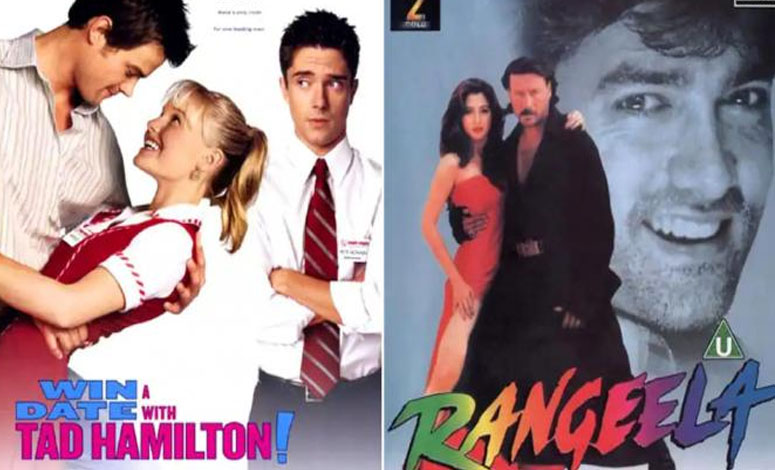Entertainment
Top 5 Hollywood movies that were ‘highly inspired’ from Bollywood classics
In a fascinating twist, this article explores the top 5 Hollywood movies that were highly influenced by Bollywood classics.

While Bollywood is often criticized for remaking Hollywood classics, the cinematic exchange goes both ways, with Hollywood also drawing inspiration from Bollywood treasures. In a fascinating twist, this article explores the top 5 Hollywood movies that were not just inspired but highly influenced by Bollywood classics.
Shedding light on this intriguing phenomenon, we delve into instances where Hollywood has reimagined narratives from the vibrant world of Indian cinema. As the cross-cultural exchange continues, it’s worth noting that the latest addition to this trend is the Hollywood remake of the Bollywood hit “Drishyam,” adding a new chapter to the dynamic relationship between these two cinematic powerhouses.
#5. Win a Date with Tad Hamilton! (2004) Rangeela (1995)

Win a Date with Tad Hamilton! (2004) – Rangeela (1995) (Source: Twitter)
“Win a Date with Tad Hamilton” unfolds a romantic dilemma reminiscent of the Bollywood classic “Rangeela.” The plot revolves around a girl caught at the crossroads between her best friend and a renowned movie star. In a departure from the expected narrative, the film introduces an ordinary individual vying for a girl’s affection against the allure of a glamorous celebrity.
Echoing the themes of choice and love, the storyline captures the essence of romantic conflict. Unlike “Rangeela,” this Hollywood take on a similar premise adds a contemporary twist to the age-old tale of choosing between familiarity and stardom, offering a delightful and relatable cinematic experience.
#4. Leap Year (2010)—Jab We Met (2007)
Leap Year (2010) – Jab We Met (2007) (Source: Twitter)
In a captivating tale of serendipity, both the Hindi film and its English counterpart revolve around a lively, talkative girl on a mission to propose to her boyfriend. Fate takes an unexpected turn when she encounters a down-on-his-luck man, leading them to share a hotel room and ultimately fall in love.
Despite apparent similarities, the creator of “Leap Year” insists it’s not a remake of the Hindi version. The narrative unfolds with reunions after separation, adding layers of emotion. As audiences compare the two, the subtle nuances and shared themes prompt them to decide whether it’s a remake or a unique storytelling approach in different cinematic realms.
#3. Pearl Harbour (2001)—Sangam (1964)
Pearl Harbor (2001) – Sangam (1964) (Source: Twitter)
The remake trend in Hollywood traces back to the 1990s, with notable instances like “Pearl Harbor.” Criticised for its misleading title, the film diverged from historical accuracy to focus on a romantic love triangle. Interestingly, the similarities between “Pearl Harbour” and the Bollywood classic “Sangam” are striking.
Both narratives revolve around a love triangle involving two best friends and a girl, set against the backdrop of pilots and planes. The key distinction lies in “Sangam,” where only one friend is a pilot, while “Pearl Harbour” features both friends as pilots. This cinematic parallel underscores the enduring influence and adaptation of storytelling themes across different cultural landscapes.
#2. A Common Man (2013)—A Wednesday (2008)
A Common Man (2013) – A Wednesday (2008) (Source: Twitter)
“A Common Man” serves as the authorised adaptation of the Bollywood classic “A Wednesday.” It features Naseeruddin Shah in the original and Oscar Award winner Ben Kingsley in the Hollywood rendition. The English adaptation garnered critical acclaim, securing several accolades.
It has won, notably, Best Picture, Best Director, and Best Actor at the Madrid International Film Festival. The film’s success underscores the universal appeal of the narrative, as it seamlessly transcends cultural boundaries, resonating with audiences across different film industries.
#1. Fear (1996)—Darr (1993)
Fear (1996) – Darr (1993) (Source: Twitter)
This movie, with its English version directly translated from its Hindi counterpart, vividly captures Shah Rukh Khan’s unforgettable portrayal as a relentless stalker in “Darr.” The Hollywood adaptation mirrors the intensity of the original, depicting the stalker carving the girl’s name on his chest, a scene etched in memory from SRK’s iconic performance.
However, a notable departure occurs as the English version takes an unexpected twist, transforming the stalker into the boyfriend, diverging from the Hindi narrative where the obsessive admirer does not win the girl. This intriguing divergence adds a unique dimension to the cross-cultural adaptation, blending elements of suspense and unexpected turns in both cinematic realms.
